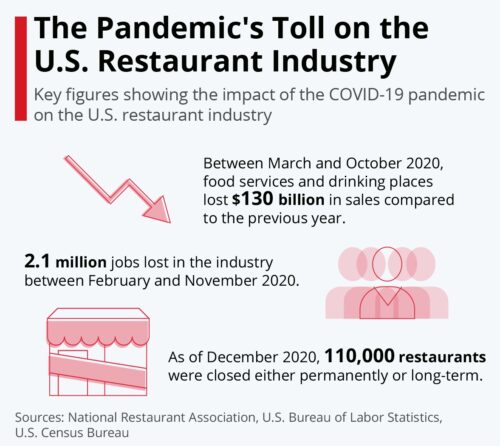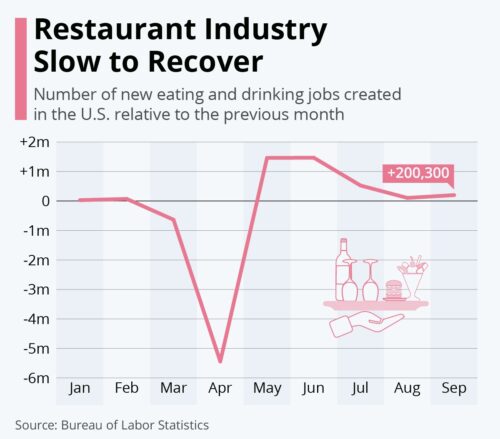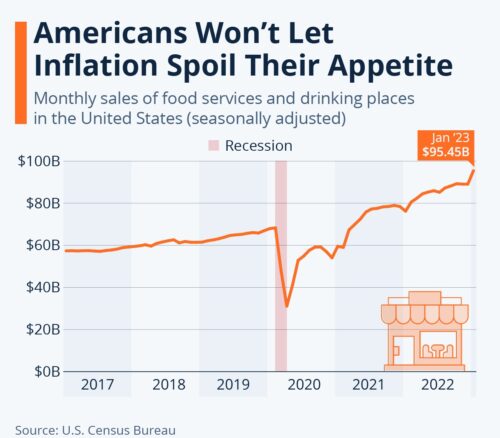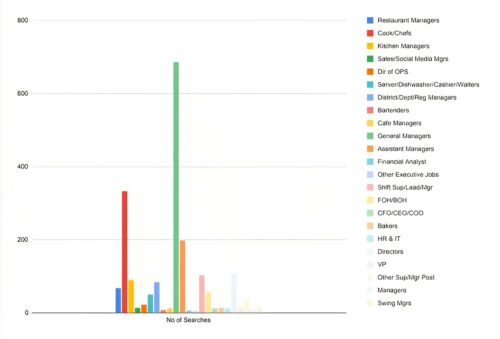Top Trends Impacting the Hospitality Industry

As we transition into the new, post-pandemic normal, it’s safe to say that hospitality will never be the same. But with disruption comes opportunity and the path forward— while different than before — will lead to new beginnings for the hospitality industry, and a future powered by technology and innovation.
The hospitality industry took a $500 billion hit during the first year of the pandemic. In 2022, the industry was struggling to meet a surge in travel demand with severely limited staffing and resources.

But as the industry navigates these hurdles, it’ll also build on the technology it developed during the pandemic to streamline operations and create new growth strategies. Ultimately, this period of regeneration will lead to a more agile, resilient hospitality industry.
The road to a full recovery is going to take time. But even during this inflationary era, people are going out and spending money on travel and leisure activities.
So in order to survive, hospitality businesses need to quickly strategize to accommodate the influx of guests in this new normal. These are the top trends that will help companies make a comeback and shape the future of the industry.

An unexpected consequence of the pandemic has been a mass exodus of workers who have left their jobs and hospitality management is struggling to find staff as they reopened their doors. It’s been dubbed the Great Resignation.
This labor shortage has hit the industry particularly hard:
- In August of 2021, 890,000 hospitality workers left their jobs, double the national average.
- Restaurants are short 3 million workers
- 58% of hospitality workers plan to leave their jobs
- Many hotels are operating with less than 70% of the housekeeping staff they need
Why is this happening?
- 52% of the workforce experienced burnout during the pandemic
- Workers have been reassessing their career choices and are forging new paths
- Workers have used this time to gain new skills and have taken other jobs that offer a better work-life balance. With the competition for talent, workers have the upper hand and more freedom to make big changes

After two years of crisis management, companies will start getting back to business as usual. They’ll leverage the lessons learned and the technology acquired during the pandemic to create new revenue streams, build a thriving workforce, and gain a competitive advantage with digitalization.
Hospitality organizations will need to focus on making big improvements to both the guest and employee experience.
Reputation, exceptional service, and being an attractive, competitive employer in a job seeker’s market will be key corporate initiatives in the coming years.
The hospitality industry is constantly evolving, driven by changing consumer preferences, technological advancements, and global events. In 2023, several trends are shaping the hospitality industry and transforming the way businesses operate and serve their guests.
We will explore the top trends impacting the hospitality industry.
The Rise of Connected Hospitality
If you think the Internet of Things (IoT) is just for manufacturing, think again. Welcome to connected hospitality!
In 2023, hospitality will become a more data-driven industry. From building systems to CRM platforms, companies will create a connected environment where different networks and software can connect an entire organization for greater efficiency.
Companies will invest in smart technology to gather actionable insights into their business, their customers, and their employees to make decisions that deliver better outcomes.
Connected systems and people will allow hotel management to achieve a leaner operational status by reducing redundancy and waste. Other benefits of IoT in hospitality include:
- Guests will experience a seamless experience from booking to check-out
- Companies can operate effectively despite the labor shortage
- Optimize facility function and efficiency and enable predictive maintenance
- IoT can create a system of checks and balances to ensure regulatory compliance
- Help companies find alternative solutions when supply chains are disrupted
Sustainability
The trend towards sustainability is gaining momentum, and consumers are increasingly concerned about the environment and expect hospitality businesses to operate in a responsible and eco-friendly manner. This trend has led to the adoption of sustainable practices such as energy-efficient technologies, waste reduction, and locally sourced products.
Hospitality businesses that embrace sustainability are not only benefiting the environment but are also attracting a growing number of eco-conscious consumers.
Technology
The use of technology is rapidly transforming the hospitality industry. Mobile apps, online bookings, self-check-in kiosks, and virtual concierge services are just some examples of the ways in which technology is being used to enhance the guest experience.
With the COVID-19 pandemic, contactless technologies have become even more important in hospitality businesses. The adoption of technology not only enhances the guest experience but also streamlines operations, reduces costs, and improves efficiency.
Personalization
Guests are looking for personalized experiences that cater to their individual needs and preferences. Hospitality businesses are using data analytics and guest feedback to tailor their services and create unique experiences for each guest.
Personalization can be achieved through various means, including room preferences, dietary restrictions, and personalized recommendations based on the guest’s past purchases or behaviors. By offering personalized experiences, hospitality businesses can improve guest satisfaction, drive loyalty, and increase revenue.
Health and Wellness
The COVID-19 pandemic has highlighted the importance of health and wellness, and guests are now more focused on maintaining a healthy lifestyle. Hospitality businesses are responding by offering healthy dining options, fitness facilities, and wellness programs.
Guests are also looking for properties that prioritize hygiene and cleanliness. Hospitality businesses that invest in health and wellness are attracting a growing number of health-conscious guests.
Diversity and Inclusion
The hospitality industry is becoming more aware of the importance of diversity and inclusion. Businesses are working to create more diverse and inclusive environments, which can lead to increased employee satisfaction and improved guest experiences.
The trend towards diversity and inclusion also extends to the food and beverage offerings, with hospitality businesses embracing a wide range of cuisines and flavors from around the world.
Contactless Service
The COVID-19 pandemic has accelerated the trend toward contactless service. Hospitality businesses are adopting contactless technologies such as mobile payments and digital room keys to reduce physical contact and enhance guest safety.
Contactless service not only addresses the guest’s concerns around hygiene but also streamlines operations and reduces costs.
In conclusion, the hospitality industry is being shaped by several trends in 2023, including sustainability, technology, personalization, health and wellness, diversity and inclusion, and contactless service.
Hospitality businesses that embrace these trends are better positioned to meet the changing needs and preferences of their guests, stay ahead of the competition, and drive growth and success.
Why restaurants should focus on talent acquisition.
Restaurants can focus on talent acquisition by implementing various strategies such as:
- Creating a strong employer brand: Restaurants can build their employer brand by highlighting their values, culture, and mission, and by showcasing the experiences of current employees. This can attract candidates who share the same values and are looking for a positive work environment.
- Offering competitive compensation and benefits: Restaurants can offer competitive wages, health insurance, retirement plans, and other benefits to attract and retain top talent.
- Providing training and development opportunities: Restaurants can invest in training and development programs to help employees develop new skills and advance their careers. This can help attract candidates who are looking for opportunities to learn and grow.
- Building a diverse and inclusive workforce: Restaurants can create a diverse and inclusive workplace by actively recruiting candidates from different backgrounds and providing a welcoming and supportive environment for all employees.
- Be sure current employees are being compensated the equivalent of what is offered to new employees. If a restaurant is not in a financial position to compete with the higher rates being offered by larger chains, be strategic about employee retention by offering regular raises.
- Nine in ten restaurant managers started in entry-level positions, so it’s safe to say a restaurant’s next manager may come from its internal team. Map out a career path and begin working on the skills associated with each step on their career path. For example, if an employee is interested in being a lead line cook, start that person on prep projects, then progressively add jobs that move the employee forward. By doing so, you’re not only offering employee development, but you’re also building the staff member’s value to your restaurant group.
- Building relationships with your staff is a crucial part of a comprehensive approach to employee retention. It’s the number one insurance toward retention. Learn what motivates employees. Everyone is different. Perhaps they are motivated by a flexible schedule, money, or a fun work environment. In an employee market, managers must be more attentive to employees’ needs.
- Keep employees happy when coming to work by creating a schedule with each employee’s requests in mind. Posting the schedule far in advance will give employees time to reschedule shifts if needed and give everyone time to plan and optimize their time away from work. If possible, provide employees the ability to self-manage schedule changes, swaps, and pick up shifts.
- When employees do quit, be sure to conduct an exit interview to learn what went wrong. While it may be too late to retain employees at this stage, restaurant managers can gain useful insights toward retaining future employees.
- Better yet, restaurant managers should conduct frequent check-ins with employees to understand their level of satisfaction. Understanding what might not be working for an individual provides the insight to make real-time changes that could help retain that employee.
- Employee retention is a major challenge for all restaurant operators but building innovative employee retention strategies into a hiring strategy is the first step in both hiring the right employees and encouraging them to grow with the restaurant business.
- Leveraging technology: Restaurants can use technology to streamline the recruitment process and attract top talent. This can include using social media and job boards to reach a wider audience and using AI-powered tools to screen resumes and assess candidates.
- To improve customer satisfaction: Hiring talented and skilled employees can help improve the quality of the food and service, resulting in a better dining experience for customers. This can lead to repeat business and positive reviews, which can attract new customers.
- To increase productivity: Skilled and motivated employees can work more efficiently, resulting in increased productivity and improved profitability for the restaurant.
- To reduce employee turnover: High turnover rates can be costly for restaurants in terms of recruitment and training expenses. Focusing on talent acquisition can help reduce turnover by hiring the right people and providing a positive work environment.
- To maintain a positive reputation: Hiring talented and skilled employees can help maintain the restaurant’s reputation for quality and excellence. This can lead to positive word-of-mouth referrals and a strong brand image.
- To stay competitive: In a highly competitive industry, restaurants need to attract and retain top talent to stay ahead of the competition. Focusing on talent acquisition can help restaurants build a skilled and dedicated workforce that can help them stand out in the marketplace.
Overall, talent acquisition is a critical part of a restaurant’s success, as it can help improve customer satisfaction, increase productivity, reduce turnover, maintain a positive reputation, and stay competitive.
By implementing these strategies, restaurants can attract and retain top talent, which can lead to higher productivity, improved customer service, and a better overall dining experience for customers.
Having a positive, supportive company culture is one of the best things you can do for staff retention and attracting new talent.
Make sure to have clear communication with staff — they should know your expectations, the hours and shifts they’ll be working, and what they can do to progress within your business. Clear, concise communication is a great way to build up employee trust and show people that they are valued within your company.
Staff should also feel able to bring any issues to management and feel empowered to discuss ways of making things more efficient or enjoyable in the workplace. Whether it’s managing conflict or embracing new ideas, having an open and honest company culture can help to make your workplace a more positive, encouraging environment where everyone feels valued.
Allow staff to bring their ideas to you, and make a concerted effort to implement the ones that will work well for your business. You could find yourself rewarded with not only better employee retention, but also some great new methods of working that could make your business run more smoothly.
Positive company culture doesn’t just stop at communication either. Being a successful restaurant owner means keeping your processes organized and knowing when to delegate tasks to other team members. A reliable, well-organized system will make employees feel more at ease when you’re not around, as they’ll always know what to do and where to go for help if they need it.
As a result, your processes will be more efficient, the staff will feel more secure, and they are more likely to continue working at your restaurant.

The illustrated graph above shows all the job searches done at RestaurantZone in the year 2022, The top 3 job searches were for the post of General Managers, Cook/Chefs & Assistant Managers.
MUST-KNOW US RESTAURANT INDUSTRY STATISTICS [2023]
45+ Must-Know US Restaurant Industry Statistics [2023]: How Many Restaurants Are In The US – Zippia
6034 total views, 1 today











